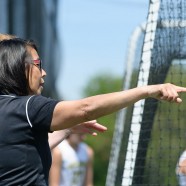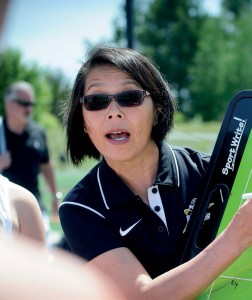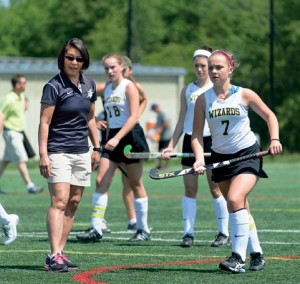
When Donna Chung was 26 years old, she was ready to quit playing field hockey for good. The two-time collegiate All-American at the University of Iowa was struggling to earn a spot as a goalkeeper on the U.S. National Team. She figured the time had finally come to move on with her life. “I really did quit in my mind,” recalls Donna. “There was another goalie, and she was better than I was, so I thought, ‘I’m done.’” Then she had a revelation. “I decided I was going to play field hockey until it stopped being fun. And it never stopped being fun. I just kept going.”
And going. After Donna beat out her rival for the starting spot, she played goalie for the U.S. at the 1988 Olympic Games in Seoul, Korea, and continued representing her country for more than two decades, on and off. While Donna’s career could be defined by a series of impressive numbers — shots saved, international appearances, years on the national team — she doesn’t even care to know her career statistics. The secret to her longevity and many achievements was ignoring those metrics. She paid no attention to her age or the number of goals she’d stopped or allowed. Instead, she just played.
Donna was pulled into the goal as a kid. She had no choice, really. Her three older brothers and their friends were always playing street hockey and they needed someone to guard the net. She wanted to be included, so she became the goalie. “They were whipping shots at me all the time,” she recalls. “When you’re a kid, you don’t think about whether you’re playing against boys or girls. You just want to compete. The older boys shot harder and faster, so that prepared me.”
 At Milton, Donna switched from the pavement to the field, then went on to start in goal for the University of Iowa. The college’s field hockey program was new, and the squad wasn’t particularly talented, but this proved to be good training. “We weren’t that great, so all the other teams just kept shooting on us,” she says. Still, Donna stopped enough of those shots to earn a place in the University of Iowa Athletics Hall of Fame. By the time she won a spot on the national team, she’d also begun to learn that there was far more to defending the goal than simply deflecting shots.
At Milton, Donna switched from the pavement to the field, then went on to start in goal for the University of Iowa. The college’s field hockey program was new, and the squad wasn’t particularly talented, but this proved to be good training. “We weren’t that great, so all the other teams just kept shooting on us,” she says. Still, Donna stopped enough of those shots to earn a place in the University of Iowa Athletics Hall of Fame. By the time she won a spot on the national team, she’d also begun to learn that there was far more to defending the goal than simply deflecting shots.
In field hockey, an offensive player can only shoot inside the circle, a semicircular arc with a 16-yard radius, centered on the goal. The average shot travels more than 50 miles per hour, rocketing from the offensive player’s stick to the goal in a mere fraction of a second. Clearly, a goalie has to be fast. “I can react very quickly to an object coming at me,” Donna says. But this is only one part of the game. The goalie’s first task, Donna says, is controlling the circle. “There’s always going to be chaos in the circle,” she says. “You have to organize that chaos.”
As a goalie, Donna was constantly ordering her defenders around the field, changing her position, and generally thinking two or three passes ahead, the way a chess grandmaster sees a board. One common trick was coaching her defenders to push the opposing team toward the sidelines. If a player charged up the middle with the ball, she had multiple passing lanes, and she was looking at a much wider goal. From the sidelines, the player’s passing options were limited, and the goal was effectively smaller, since the attacker was shooting from a sharper angle. The shots might travel just as fast, but the openings were smaller, giving Donna a better chance at a save.
Of course, she couldn’t foresee every move or shot. Her opponents did score now and then, but Donna trained herself not to dwell on those lapses or failures. Over time, she found that this approach, along with other goalkeeping lessons, could be applied off the field. “When things don’t go as planned, you have to read the situation and react,” she says. “You have to go to Plan B or Plan C.”
In Donna’s case, Plan B was more enjoyable than expected. When she stopped playing for the outdoor national team, Donna was still enjoying herself. Remembering the promise she’d made to herself when she was younger, she switched to indoor competition. The smaller field, along with a smaller circle of chaos, actually favored the age-defying athlete. Indoor field hockey was faster, but the speed kept Donna more focused. In the outdoor game, she’d sometimes find her mind drifting when the ball was at the other end. But she couldn’t let that happen indoors, since the ball could move from the opposite goal to her circle in a few seconds. “The ball moves so fast, so you have to be engaged,” she explains.
 Although she avoids citing statistics, Donna happily recalls one highlight, which took place during an outdoor game against the Netherlands late in her career. “Anytime we got to play them was special,” she says. “The speed, the beauty, the flow of the game — it was like a clinic.” In that last match, though, Donna served up a lesson of her own when the game ended in the field hockey equivalent of a penalty shootout. “I stopped four out of five shots,” she says, “and I’ll never forget the faces of the Dutch players. Their jaws just dropped.”
Although she avoids citing statistics, Donna happily recalls one highlight, which took place during an outdoor game against the Netherlands late in her career. “Anytime we got to play them was special,” she says. “The speed, the beauty, the flow of the game — it was like a clinic.” In that last match, though, Donna served up a lesson of her own when the game ended in the field hockey equivalent of a penalty shootout. “I stopped four out of five shots,” she says, “and I’ll never forget the faces of the Dutch players. Their jaws just dropped.”
Eventually, the rigors of throwing herself onto the field to stop one shot, then jumping to her feet to block the next one, proved too taxing. Donna stopped competing at the international level, but she still coaches, referees and plays whenever possible. She also finished her playing career on a high note. At her last international tournament, the 2010 Indoor Pan American Games in Venezuela, Donna was already a legend in the sport, according to former teammate Jen Nixon-Mathis. Some of their teammates were actually teenagers. Yet Donna did more than keep up with the younger crew. “She won goalkeeper of the tournament,” says Nixon-Mathis. “I don’t even know how old she was.”
by Greg Mone



